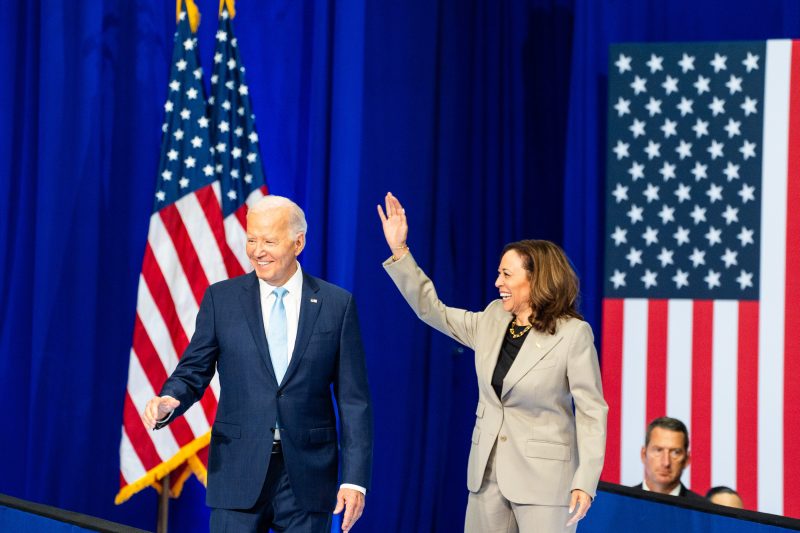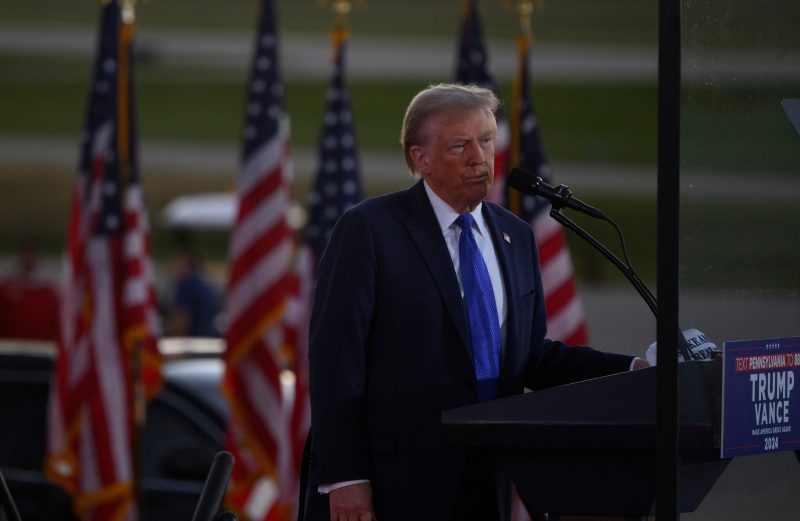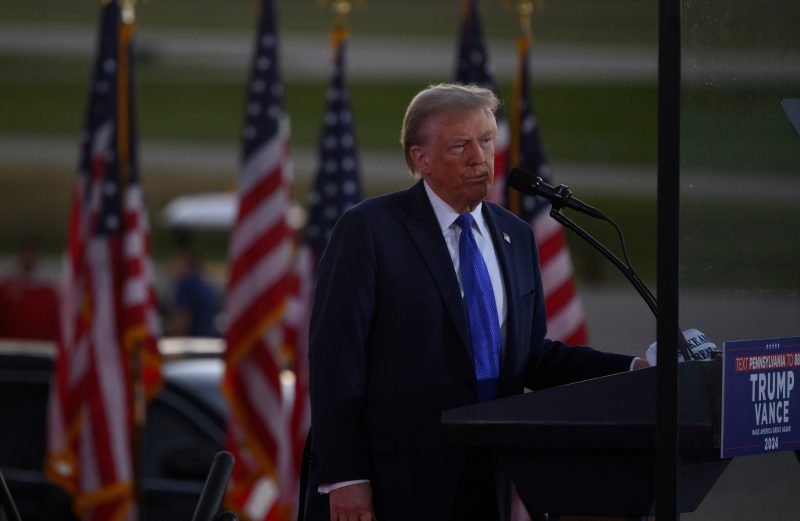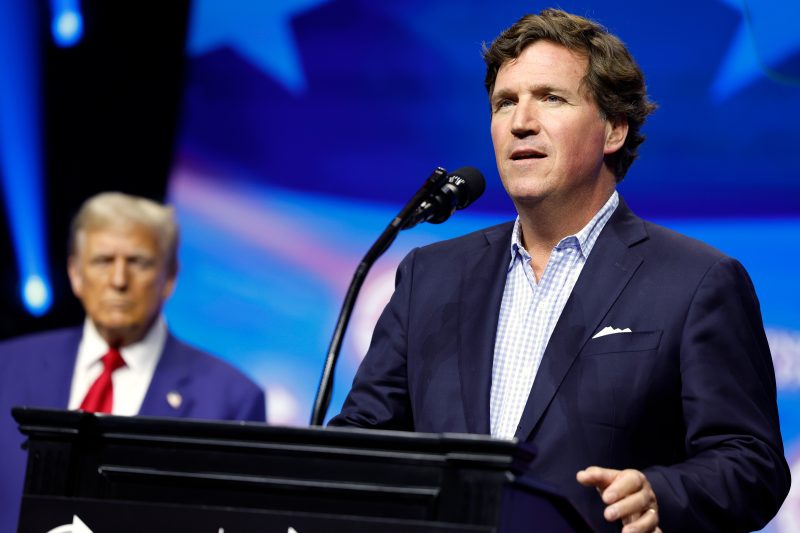
Harris holds slight national lead over Trump, Post-ABC-Ipsos poll finds
Vice President Kamala Harris holds a narrow lead over former president Donald Trump in the presidential election, a notable improvement for Democrats in a contest that a little more than a month ago showed President Joe Biden and Trump in a dead heat, according to a Washington Post-ABC News-Ipsos poll.
As Democrats gather this weekend in Chicago for the upcoming national convention, Harris stands at 49 percent to Trump’s 45 percent among registered voters in a head-to-head matchup. When third-party candidates are included in the survey, Harris is at 47 percent and Trump at 44 percent, with Robert F. Kennedy Jr. at 5 percent. In early July, Trump stood at 43 percent, Biden at 42 percent and Kennedy at 9 percent.
Given the margin of error in this poll, which tests only national support, Harris’s lead among registered voters is not considered statistically significant. The vice president’s three-percentage-point advantage in a race that includes third-party candidates is slightly smaller than Biden’s 4.5-point popular vote margin in 2020, which translated into an electoral college majority.
Though the dynamics of the campaign have shifted since Biden left the race in July, the findings in the new Post-ABC-Ipsos poll continue to point to a tight election in November, when seven swing states — Michigan, Pennsylvania, Wisconsin, North Carolina, Georgia, Arizona and Nevada — are likely to determine who wins in the electoral college. Other public polls have indicated that Harris has gained ground in most if not all those swing states since Biden left the race, but they, too, show the race in most of those statesas being within the range of a normal polling error.
One sign of how the shift from Biden to Harris has affected voters’ attitudes is on the question of how satisfied people are with the choice of Harris vs. Trump. In July, when the contest was still Biden vs. Trump, 28 percent of voters overall said they were satisfied with the choice. Today, 44 percent say they are satisfied with the choice of Harris or Trump.
The biggest shift in sentiment has come among Democrats. Last month, 20 percent of Democrats said they were satisfied with the choice of Biden vs. Trump. Now, with Harris as the party’s nominee, 60 percent of Democrats express satisfaction with the current matchup.
A 62 percent majority of Harris voters say they support her “strongly,” compared with 34 percent of those who supported Biden last month.
That change has been palpable as Harris and her running mate, Minnesota Gov. Tim Walz, have barnstormed through battleground states, drawing huge and enthusiastic crowds. The rallies have been so large that they appear to have unsettled Trump, who falsely claimed that photos of turnout for the Democratic ticket at one event were fake and generated by artificial intelligence.
The new poll comes after a remarkable series of events that began with Biden’s disastrous performance in the June 27 CNN debate in Atlanta. The weakness Biden displayed that night prompted ever-increasing calls from leading Democrats for him to stand down as they feared that his continued presence at the top of the ticket could put not only the White House in jeopardy but also lead to the loss of the Senate and the failure to regain the majority in the House.
Biden yielded to the pressure on July 21 and endorsed Harris for the Democratic nomination. That handoff was unprecedented at this point in a presidential campaign, and Harris’s quick consolidation of her party has dramatically altered the trajectory of the election. Democrats hope to build on the current momentum with their convention in Chicago ahead of a Sept. 10 debate, hosted by ABC News, between the two nominees.
In a head-to-head matchup with Trump, Harris has improved her standing over Biden among several key groups in the Democratic coalition, including voters under the age of 40 and independents who lean Democratic.
The Post-ABC-Ipsos poll shows her margin over Trump among voters under age 40 at 25 percentage points, compared with Biden’s seven-point advantage in July.
She also has improved over Biden among independents, who support her by a margin of eight points compared with the two-point margin for Trump last month. That change was concentrated among Democratic-leaning independents, who shifted from 77 percent supporting Biden after the first debate to 92 percent for Harris in the new poll.
Black voters’ support for Harris is slightly larger than it was for Biden last month: 79 percent supported him then and 83 percent support her now.
Among White voters with college degrees, Harris leads Trump by 10 points and is faring about the same as Biden with this group. Among White voters without college degrees, her deficit against Trump is 27 points, also similar to the 31-point deficit for Biden in July.
Biden’s job approval ratings have hardly changed since he left the race, with 55 percent saying they disapprove of the job he is doing and 37 percent saying they approve — a net negative of 18 points. Those approval ratings, along with national and swing-state polls showing him trailing Trump, were principal factors in the effort among Democrats to persuade the president to step aside.
Harris too has a net negative job approval rating, but less so. In the latest poll, 39 percent say they approve of the job she is doing as vice president, while 49 percent disapprove and 12 percent say they have no opinion — a net negative of 10 points.
Trump does better than either Biden or Harris in a retrospective look at his presidency. Today, 44 percent say they approve of the job he did as president between 2017 and 2021, while 49 percent say they disapprove, a net negative of five points. Almost without exception, these ratings are better than he did when he was in office.
But when asked whether they had a favorable or unfavorable view of Trump and Harris “as a person,” Trump does worse than Harris. Views of the vice president split almost evenly, with 45 percent expressing a favorable impression and 44 percent an unfavorable one. Trump is net-negative 22 points on favorability, with 35 percent viewing him favorably and 57 percent unfavorably.
Another area where Harris stands better than Biden is on personal attributes, where she leads Trump on all five qualities that were measured.
Throughout the campaign year and especially after the CNN debate, Trump, 78, had huge advantages over Biden, 81, on mental sharpness and physical health. Today Harris leads Trump on both. Trump led Biden by 30 points on mental sharpness and 31 points on physical health in July. Harris, 59, bests Trump on mental sharpness by nine points and on physical health by 30 points.
She also is seen as more honest and trustworthy than Trump, by a margin of 15 points. She has smaller advantages over Trump on questions of which candidate “represents your personal values” (six points) and who “understands the problems of people like you” (seven points).
The percentage of American adults who have an unfavorable view of both — the so-called “double haters”— is now 13 percent, down from 19 percent last month when Biden was in the campaign. Among this group, Trump is heavily favored over Harris.
Americans are closely divided on how they would feel if Harris were elected in November, with 50 percent saying they would be either “enthusiastic” or “satisfied but not enthusiastic” and 48 percent saying “dissatisfied but not angry” or “angry.”
Views on Trump are slightly more negative, with 45 percent expressing a positive reaction to a victory by him and 53 percent a negative reaction, including 34 percent who say they would be angry. That last figure is 13 points higher than those who say they would feel angry if Harris wins.
More than 4 in 10 Americans (46 percent) say Harris’s views on most issues are “too liberal,” while 6 percent say they are “too conservative” and 43 percent say they are “about right.” For Trump, 42 percent say his views on issues are too conservative, 9 percent say too liberal and 44 percent say they are “about right.”
The economy and inflation remain the dominant issues in the election, with about half of all Americans saying each is “one of the single most important” in their choice of a candidate.
Four in 10 say protecting American democracy is one of the single most important issues, though Democrats are significantly more likely to cite this issue than are Republicans or independents. Next on the list is the situation at the U.S.-Mexico border, though this issue is far more significant to Republicans than to Democrats or independents.
Below those issues in significance are a series of others that have been part of the campaign-year dialogue: health care, crime and safety, abortion, gun violence and appointments to the Supreme Court. Democrats are far more likely to cite the last three as important along with health care,while Republicans are more likely to mention crime and safety.
Meanwhile, just 14 percent of Americans say the war between Israel and Hamas is one of the single most important issues in their vote this fall. This issue has caused splits within the Democratic coalition this year and unhappiness with Biden’s handling of the war. Harris has taken a firmer line than the president in calling for a cease-fire, though she is generally aligned with him on overall policy. Democrats are preparing for protests from pro-Palestinian demonstrators at the Chicago convention next week.
A similarly low percentage cite race relations as one of the single most important issues in their vote (13 percent).
On a list of 11 issues, Harris is seen as more trusted than Trump on six of them. The former president is more trusted on the economy, inflation, immigration and the Israel-Gaza war. Harris’s advantages come on race relations, abortion, health care, protecting democracy, appointments to the Supreme Court and gun violence.
Her only double-digit advantages are with the first two: race relations and abortion. Trump holds a 10-point lead on immigration — though Harris’s deficit is four points smaller than was Biden’s last month — and Trump now holds nine-point leads on the economy and inflation.
Americans continue to see the economy in negative terms, with 72 percent saying the current economy is either “not so good” or “poor.”
Nearly 6 in 10 Americans say they believe Harris has had “just some” or “very little” influence on the administration’s immigration policies and more than 6 in 10 say she’s had limited influence on the administration’s economic policies. Democrats are more likely to say she has had more significant influence than are Republicans or independents.
Meanwhile, a majority of Americans (56 percent) say Trump had at least a good amount of influence for the Supreme Court’s 2022 decision ending the constitutional right to an abortion, which about 3 in 5 Americans oppose. Over 8 in 10 Democrats and over half of the Americans who strongly oppose that ruling say Trump influenced the outcome.
The Post-ABC-Ipsos poll was conducted online Aug. 9-13 among 2,336 U.S. adults, including 1,901 registered voters. The sample was drawn through the Ipsos KnowledgePanel, an ongoing panel of U.S. households recruited by mail using random sampling methods. The results have a margin of error of plus or minus two points for U.S. adults and 2.5 points among registered voters. Error margins are larger among other subgroups.



